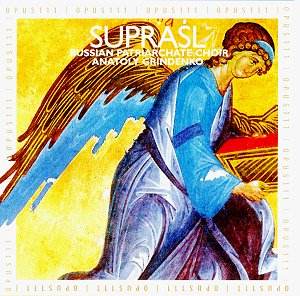Suprasl - Orthodox Mosaic from Suprasl Monastery
 The Russian Patriarchate Choir
conducted by - Anatoly Grindenko
The Russian Patriarchate Choir
conducted by - Anatoly Grindenko
 Recorded 1996 in L'Eglise
du Liban, Paris. OPUS 111 OPS 30-229 DDD [78.58]
Recorded 1996 in L'Eglise
du Liban, Paris. OPUS 111 OPS 30-229 DDD [78.58]
Crotchet
Amazon
UK
Amazon
USA

This disc is wonderful. If you like listening to deep Russian basses in full
flight, then this is a disc for you. The Russian Patriarchate Choir consists
of twelve members, and was formed in 1980 by Anatoly Grindenko. Its main
area of activity was that of concentrating on the repertoire of the Russian
Orthodox liturgy, and was different in that the choir is small, representative
of the scale of ensemble used by many churches throughout Russia. It concentrates
on singing restored ancient works, many of which had fallen into obscurity.
The works on this disc are good examples of this genre, being of 16th century
provenance. The monastery of Suprasl was founded in 1498 by Prince Alexander
Khodkievich on the banks of the river Suprasl, not far from Bielostok (in
today's Poland). The new monastery took in monks from Mount Athos and the
monastery in the caves of Kiev. Both bodies brought their own traditions
of rites and chants.
In the seventeenth century this monastery was considered to be the foremost
centre of the Orthodox world, achieving renown through its library, printing
workshop, copying workshop and school. The monastery had its own choir which
was famous in the outside world. This choir was made up of both monks as
well as lay members.
Great attention was focused on singing, and chant books were produced to
ensure that the format and content of the old styles were maintained. The
Suprasl heirmologian was a complete edition of these chants and other musical
items, and was probably compiled to celebrate the centenary of the formation
of the monastery. It consisted of 1,130 pages, and this disc can only therefore
be a very small example of the contents.
Throughout the seventeenth century, copies were distributed throughout the
Orthodox world, and used extensively. The actual heirmologian, beautifully
printed in traditional Balkan style with illuminated capitals, decorated
margins and illustrated miniatures was lost during the 1930s, but found again
in 1972.
Anatoly Grindenko, having found the manuscript, began restoring it and completing
some missing sections by copying out the relevant chants. The book covers
services for the whole of the Orthodox year, some of them originating in
Mount Athos, and others from Kiev. Most of the content however was written
in Suprasl, and so the complete book is an amalgam of these styles.
Much research has been done to translate the old styles into modern notation,
and the results of some of this work are here superbly presented to allow
us a glimpse of what the Orthodox empire was experiencing in the 1500s and
1600s.
Reviewer
John Phillips

